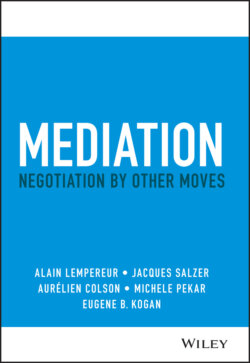Читать книгу Mediation - Alain Lempereur - Страница 10
Authority
ОглавлениеConflict resolution systems are often founded on authority. In private life, parents have the authority over their children and over the rules to address familial conflict. In organizations, the upper level has “formal“ authority – drawing on the official title or position in the hierarchy – to settle conflicts at the lower levels. In society, overall, the law, in distinguishing between what is legal or not, makes each person part of a system of conflict prevention and regulation. If, despite everything, two parties are in conflict about the interpretation of a legal norm, the judge is there to decide with all the authority conferred upon them by the law. In each case above, authorities are entrusted with the role of ending the conflict.
But authority shows its limits in contemporary society, owing to a combination of factors, including the rise of individualism; the erosion of moral, or religious, norms; the decline, renewal, or rejection of traditional authority figures – the father, instructor, professor, priest, police officer, etc.; the growing influence of liberalism and its deregulation; the democratization of societies and decision‐making systems; an increased transparency and questioning of hierarchy in organizations (i.e. “flat organization”); the decline of Fordist business as a bureaucratic organization; the contestation of legitimacies – scholarly, scientific, technical, legal, administrative – and biases – patriarchy, gender, race, ethnicity, sexual orientation – and, in return, the rise of participative mechanisms of consultation, dialogue, and negotiation.
The First Move: A Negotiator's Companion (Lempereur and Colson, ed. by Pekar 2010) summarized the tendency of this vast sociological movement: “impose less and propose more.” In conflict management, whatever the context, the involved parties hardly accept a solution imposed on them by an outside authority. There is, everywhere, a growing desire to stay in control of one's life, plans, and trajectory – including one's conflict and its settlement.
The rise of negotiation as a mode of joint decision‐making aligns with this shift away from unilateral, top‐down diktat. But what happens when negotiation fails and the parties are unable to define an agreement that satisfies both of them? One possibility is to fall back on an authority – a boss or a judge. Another is to invite a third party – neutral, impartial, and benevolent – to reignite negotiations, facilitate the exchanges, and empower the parties to explore the conflict, bring their essential needs to the surface, imagine possible solutions, evaluate them, and finally choose those to which they freely and mutually commit. This is, in a few words, what mediation stands for: it offers a pursuit of negotiation by other moves. It reinforces a trend where the law is first the law of the people (Lempereur 2011a, 2011c).
A mediator is not an authority per se. They do not have the power to make decisions. They do not coerce, choose favorites, and very rarely impose limits. On the contrary, they always seek to empower the parties. They facilitate, encourage, and motivate. Theirs is a strange art: the parties accept their presence at the negotiating table precisely because they have no formal authority over them. This is why, when mediation succeeds, the parties are more likely to recognize the agreement that they themselves produced – with the mediator's support – and discover the strength of this process of third party's facilitated negotiation, and its profound legitimacy.
